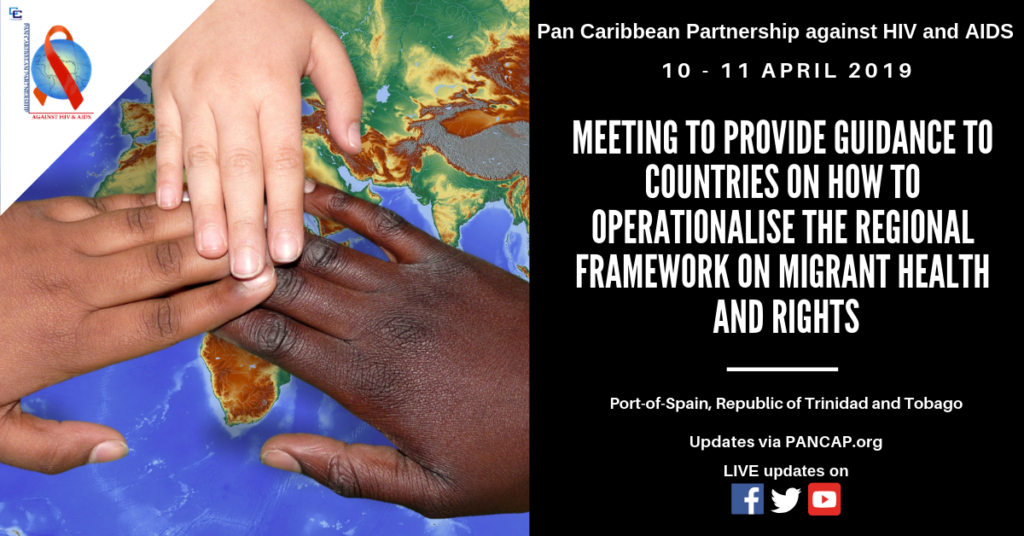Meeting to provide guidance to countries on how to operationalise the regional framework on migrant health and rights

Hyatt Regency Trinidad
No 1, Wrightson Rd,
Port of Spain, Republic of Trinidad & Tobago.
pancap@caricom.org
Event Summary
The Pan Caribbean Partnership against HIV and AIDS (PANCAP), with funding from the Global Fund to Fight AIDS, Tuberculosis and Malaria, will host a Meeting to finalise guidance to countries for Operationalising the Regional Framework on Migrant Health and Rights. The meeting will be held in Port-of-Spain, Republic of Trinidad and Tobago on 10 and 11 April 2019.
Event Description
CONTEXT
CARICOM governments have signed on to the International Organization for Migration (IOM) and other relevant international conventions as evidence of their commitment to protect and promote the rights of migrants. The International Convention on the Protection of Migrant Workers and Members of Their Families 1990 is the most comprehensive instrument protecting the rights of migrants but only St Vincent and the Grenadines has ratified this convention. With respect to migrant workers, some countries have ratified the following conventions: #97 Migration for Employment; #111 Concerning discrimination in respect of employment and occupation, and #138 Concerning minimum age for admission to employment.
Previous assessments/studies have found that in the majority of countries, the HIV-related needs of migrants and mobile populations are not integrated in the national HIV response and existing health care programmes. Little data is available on diverse mobile populations and there are no culturally and linguistically appropriate HIV intervention programmes targeting mobile populations, especially high-risk groups including sex workers and MSM. Strict immigration policies adopted by some governments may drive sex workers underground, thereby making them and their clients more vulnerable to contracting HIV. Migrant workers in some countries are consistently listed among the most vulnerable populations owing to, among other factors; their legal status, lack of access to information and services, language barriers and poverty. However, to date, no comprehensive strategies exist to address HIV prevention among this vulnerable population. There is limited understanding of the profile of the epidemic among migrant workers or the factors that increase this population’s vulnerability to HIV.
Given the challenges outlined above PANCAP, with funding from the Global Fund in June 2018, developed a regional rights-based framework to increase the access of migrants and mobile populations to HIV prevention, care, support and treatment. The Framework sets out a roadmap for equitable and non-discriminatory access to health care services across the Caribbean for mobile and migrant populations regardless of age, race, colour, sex, language, religion, political or other opinion, national or social origin, sexual orientation, gender identity, property, birth or other status. The Framework responds to the findings of two multi-country studies conducted by PANCAP over the period 2011 – 2015 which highlighted the barriers to access HIV services by migrant and mobile populations. Following a participatory approach involving representation from Government, (Ministry of Health, Chief Medical Officers, National AIDS Programmes, Immigration Officers) Civil Society (Migrant groups and other key population groups) and international and regional organisations including, PANCAP, UWI, IOM, UNHCR and UNAIDS at a regional forum in Trinidad and Tobago from the 26-27 June 2018, the mandate was for the development of a more comprehensive roadmap for a Regional Rights-Based Framework to Increase the Access of Migrants and Mobile Populations to HIV Prevention, Care, Support and Treatment.
The Framework is rationalised with the vision of regionalism under the CSME and sets out guiding principles and recommended strategies for regional and national action. The Protocol on Contingent Rights was adopted and opened for signature at the 39th Regular Meeting of the Conference of Heads of Government of the Caribbean Community held in Montego Bay, Jamaica on 4-6 July 2018. It was signed by seven countries (Barbados, Grenada, Haiti, Jamaica, Saint Lucia, St Vincent and the Grenadines and Suriname) but is not yet in force. The Protocol grants rights to CARICOM nationals exercising the right of establishment, provision of services, movement of capital or free movement of skills. Spouses and immediate dependents are also entitled to enjoy these rights.
The Framework on Migrant Health and Rights was subsequently endorsed by the Priority Areas Coordinating Committee (a technical committee of the PANCAP Executive Board), PANCAP Executive Board and the Council for Human and Social Development – Ministers of Health). The Priority Areas Coordinating Committee recommended that PANCAP should identify a model that can be used to guide countries in operationalising the Framework to their county context.
OBJECTIVES OF THE MEETING
- Share the findings of a desk review on models/guidance for operationalising the Framework on Migrants Health and Rights;
- Validate the findings of an assessment of the needs of countries’ health system to provide services for migrants;
- Solicit input from participants for finalising a guidance document on how to operationalise the Framework on Migrant Health and Rights to their country context.
OUTCOMES
- Agreement on available services for migrants, challenges to delivering services and priority actions for countries
- Agreement on key elements of the Guidance Document
